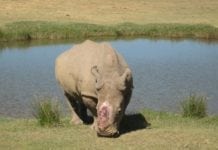‘Even instant coffee is likely to be hit hard in a world of 3°C or more,’ report says
Coffee could become extinct if global warming continues on its current trajectory, according to a report by The Climate Institute.
By 2050, researchers said, the amount of suitable coffee farmland is expected to have halved due to rising temperatures, pests and fungi.
Wild coffee is expected to be wiped from the face of the planet by the year 2080.
The disappearance of the coffee plant would have a profound impact on the 120 million people worldwide whose livelihoods depend its beans – many of whom live in the world’s poorest nations.
For several of the 70 countries in the world which produce coffee, the industry is central to their economy. More than half (59 per cent) of earnings from exports in Burundi are from the product, while the beans make up a third (33 per cent) of Ethiopia’s exports and 17 per cent of Nicaragua’s.
The majority of the coffee farmers are smallholders, meaning they are particularly vulnerable to a volatile market.
Coffee-drinkers are also expected to see flavour and aroma seriously impacted – alongside soaring prices for the ever-scarcer beans.
“Looking ahead, it is hard to see how consumer prices cannot be anything but badly affected by the projected long-term decline in growing area and other impacts of a more hostile climate,” the report said.
“More and more extreme weather events in major coffee-producing regions seem set to create supply shortages, and hotter conditions will impair flavour and aroma.
“Even instant coffee is likely to be hit hard in a world of 3°C or more.”
Dramatic changes are expected as a consequence of the increasing threats to the crops. Over the next few decades, coffee production is expected to move away from the equator and up mountains, causing deforestation.
It is not just the rising heat that will harm the crops. Climate change is expected to bring with it the spread of fungi that devastates the plants.
More – Brand Name Origins – Starbucks
After a period of unusually high temperatures and rains in 2012, Central American crops were infected with a wage of Coffee Leaf Rust, resulting in 350,000 labourers in the region being put out of work in the region.
In Columbia, the fungus is being reported in the mountains, where it was previously too cold for it to survive.
The Coffee Berry Borer, originally found in the Congo, is a major pest that has spread to many coffee producing nations.
In countries such as Tanzania, where 2.4 million livelihoods depend on coffee, the beetle has expanded its territory, leaving destroyed coffee plants in its wake.
After being attracted by hotter and wetter conditions, the beetle – previously only found below the threshold of 1,500 metres above sea level – has spread uphill.
On Mt Kilimanjaro, the beetle is now found 300 metres higher than where it was last century. Numbers are expected to “explode”, in turn devastating agricultural production, as global warming continues, the report claimed.
The Climate Institute is not the first to warn about the bleak future of the coffee bean. According to a recent report by eighty scientists at Kew Gardens, coffee is at risk of running out by the end of the century, due to climate change and intensive farming.
Mario Cerutti, a spokesperson from the coffee producer, Lavazza, acknowledged the impact climate change was having on the industry: “We have a cloud hovering over our head,” he said.
“It’s dramatically serious. Climate change can have a significant adverse effect in the short term. It’s no longer about the future; it’s the present.”





































